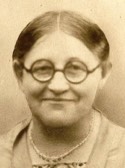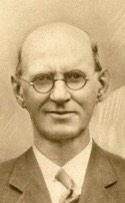Farabaugh Family History - Person Sheet
BirthFeb 24, 1865, Elder Township, Cambria County, Pa.
DeathMay 21, 1941, East Carroll Township, Cambria County, Pa.
BurialSt. Mary's Cemetery, Patton, Pa.
FatherCharles Anna (1836-1908)
MotherJustina Long (1840-1877)
Spouses
BirthApr 20, 1862, East Carroll Township, Cambria County, Pa.
DeathDec 24, 1930, Patton, Pa.
BurialSt. Mary's Cemetery, Patton, Pa.
FatherEdward Fehrenbacher (1833-1907)
MotherCatharine Elizabeth Hartman (1839-1890)
MarriageNov 17, 1885, St. Benedict's Church, Carrolltown, Pa.
ChildrenRegina Modesta (1886-1966)
Herman Charles (1887-1888)
Rose Scholastica (1889-1973)
Bertha Clotilda (1891-1974)
Modestus Francis (1892-1970)
Anicetus Edwin (1895-1971)
Alvin Clement (1897-1898)
Mary Adalaide (1898-1930)
George John (1901-1979)
Agnes J. (1903-1963)
Charles Francis (1909-1949)
Notes for Theresa Anna Anna
Theresa Anna was raised in Carroll Township, Cambria County, Pa.
Notes for Francis Englebert (Spouse 1)
Frank Farabaugh was raised in Allegheny Township, Cambria County, Pa. He and Theresa lived in and around Patton, Pa.
Frank was reared on a farm and was educated in the public schools and the so-called select normal schools of Ebensburg, Pa. He became a teacher and taught for eleven terms at various schools in Cambria County. In 1885, he opened a general store in St. Boniface, Pa., which he closed four years later in order to engage in building and construction projects in Hastings and Patton. In 1885, it was also reported that he had been clerking in the store of Thomas Ott & Co., but was engaged as a travelling saleman for a Philadelphia wholesaler. In 1891, he was called for jury duty for the December term as a resident of Elder Township.
In 1893, he made his home at 1008 Beech Avenue in Patton and was a miner until 1898, when he returned to contracting. In 1897, as a Catholic Democrat, Francis was elected minority auditor of Cambria County, In 1901, he had a dispute with the two county Republican Auditors over their recommendations to pay legal fees incurred by a a County Commissioner over a private tax dispute, and some questionable expenses charged by the Director of the Poor. Frank’s public rebuttal to the excessive spending was reported favorably, and he was re-elected in 1902. However, he lost an later attempt to become a County Commissioner. Frank also opened a wholesale liquor store in 1904, which he sold in 1905. In December of 1904, he purchased a feed and buckwheat mill in Patton, which became his main occupation and was operated until his death in 1930. The three-story brick building was at Magee and 6th Avenue and a subsequent owner removed the top two floors and converted the property to an auto body and repair shop.
Frank also maintained a home and second feed mill operation in Bakerton (aka Elmora), beginning in about 1920.
Frank was reared on a farm and was educated in the public schools and the so-called select normal schools of Ebensburg, Pa. He became a teacher and taught for eleven terms at various schools in Cambria County. In 1885, he opened a general store in St. Boniface, Pa., which he closed four years later in order to engage in building and construction projects in Hastings and Patton. In 1885, it was also reported that he had been clerking in the store of Thomas Ott & Co., but was engaged as a travelling saleman for a Philadelphia wholesaler. In 1891, he was called for jury duty for the December term as a resident of Elder Township.
In 1893, he made his home at 1008 Beech Avenue in Patton and was a miner until 1898, when he returned to contracting. In 1897, as a Catholic Democrat, Francis was elected minority auditor of Cambria County, In 1901, he had a dispute with the two county Republican Auditors over their recommendations to pay legal fees incurred by a a County Commissioner over a private tax dispute, and some questionable expenses charged by the Director of the Poor. Frank’s public rebuttal to the excessive spending was reported favorably, and he was re-elected in 1902. However, he lost an later attempt to become a County Commissioner. Frank also opened a wholesale liquor store in 1904, which he sold in 1905. In December of 1904, he purchased a feed and buckwheat mill in Patton, which became his main occupation and was operated until his death in 1930. The three-story brick building was at Magee and 6th Avenue and a subsequent owner removed the top two floors and converted the property to an auto body and repair shop.
Frank also maintained a home and second feed mill operation in Bakerton (aka Elmora), beginning in about 1920.


